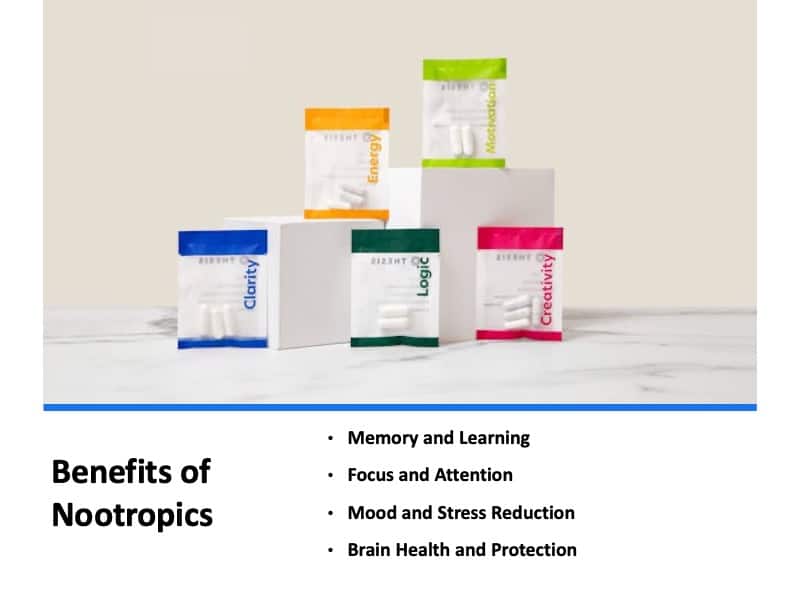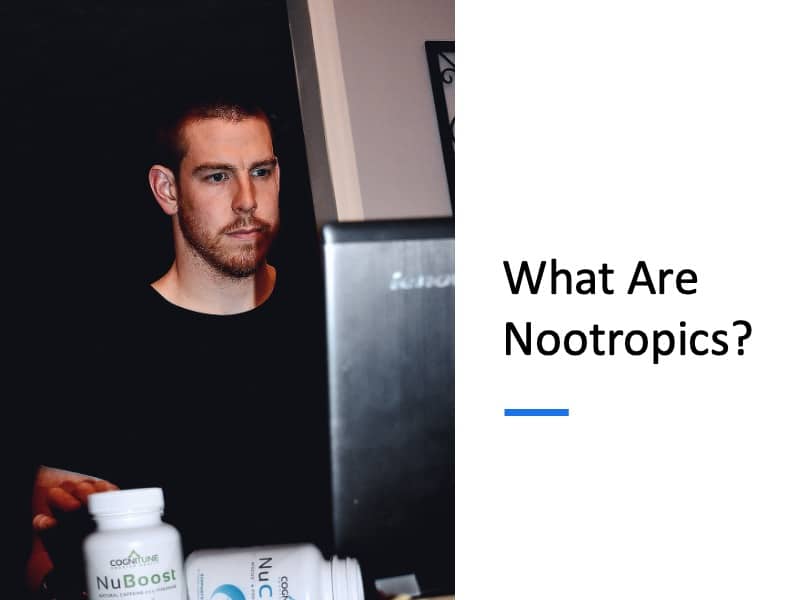What Are Nootropics and Why Are Nootropics Good for You?
Nootropics, commonly referred to as smart drugs or cognitive enhancers, are substances believed to improve brain function, including memory, focus, creativity, and motivation.
Some of these substances have scientific support, while others remain controversial.
Their popularity has increased among students, professionals, and military personnel seeking cognitive enhancement (Schifano et al., 2022).
I haven’t experimented much with dedicated nootropic supplements, but I did enjoy my experience with Cognitune NuClarity, which blends several well-known cognitive enhancers.
Over the years, I’ve used supplements containing ingredients like Panax ginseng, L-carnitine, and Ginkgo biloba and believe in their benefits for mental clarity and overall brain health.
Also, while caffeine isn’t technically a nootropic, it’s one stimulant I rely on regularly to stay sharp and focused.
This article examines the different types of nootropics, their benefits, risks, and whether they are safe and effective for cognitive enhancement.
What Are Nootropics?
Nootropics are compounds that influence brain function, first defined by Giurgea in 1972 as substances that enhance learning and memory while being non-toxic and neuroprotective (Giurgea, 1973).
They are typically divided into a few categories.
Natural Nootropics
Natural nootropics are derived from plants, herbs, and food sources. Examples include:
- Panax ginseng has been shown to improve cognitive function and reduce mental fatigue (Lorca et al., 2023).
- Ginkgo biloba, which enhances memory and increases cerebral blood circulation (Kennedy et al., 2007).
- Bacopa monnieri, which supports learning and memory retention (Calabrese et al., 2008).
- Rhodiola rosea, which reduces mental fatigue and improves resilience to stress (Shevtsov et al., 2003).
- Caffeine and L-theanine, commonly found in tea and coffee, which improve focus and alertness (Einöther & Giesbrecht, 2013).
Synthetic Nootropics
Synthetic nootropics are laboratory-designed compounds that influence cognition. Examples include:
- Piracetam, the first synthetic nootropic, which enhances memory and learning (Malykh & Sadaie, 2010).
- Modafinil, a wakefulness-promoting drug that improves executive function (Minzenberg & Carter, 2008).
- Methylphenidate, a prescription stimulant for attention-deficit hyperactivity disorder that is sometimes used off-label for cognitive enhancement (Linssen et al., 2014).
- Noopept, a cognitive enhancer that may improve learning speed (Ostrovskaya et al., 2008).
Cholinergics
Substances that boost acetylcholine, a key neurotransmitter for learning and memory, including Alpha-GPC, Citicoline, and Acetyl-L-Carnitine (ALCAR).
Mitochondrial & Energy-Boosting Nootropics
Compounds like CoQ10, PQQ, Nicotinamide Riboside (NR), and Creatine, which support brain cell energy production and reduce mental fatigue.
Is Caffeine a Nootropic?
Caffeine is one of the most widely consumed psychoactive substances and is commonly considered a nootropic due to its ability to improve alertness, reaction time, and attention.
It primarily works by blocking adenosine receptors, leading to increased wakefulness and reduced mental fatigue (McLellan et al., 2016).
However, caffeine does not meet all the original criteria of a nootropic, as it does not necessarily enhance learning or memory long-term and can have negative side effects such as jitteriness, insomnia, and dependency (McLellan et al., 2016).
When combined with L-theanine, found naturally in green tea, the cognitive benefits of caffeine may be enhanced while reducing some of the negative effects, such as restlessness and anxiety (Einöther & Giesbrecht, 2013).
How Do Nootropics Work?
Nootropics function through different mechanisms depending on the compound. Some of the most common effects include:
- Enhancing neurotransmitter activity, such as increasing acetylcholine, dopamine, or serotonin, which can improve memory, mood, and focus (Malykh & Sadaie, 2010).
- Increasing blood flow to the brain by improving cerebral circulation, as seen with ginkgo biloba and vinpocetine (Kennedy et al., 2018).
- Reducing brain inflammation and oxidative stress, which protects brain cells from damage (Malik & Tlustus).
- Modulating brain wave activity, leading to improved concentration and relaxation, particularly in compounds like caffeine and L-theanine (Einöther & Giesbrecht, 2013).
Benefits of Nootropics

The benefits of nootropics depend on the specific compound and individual response.
Research has examined several key areas.
Memory and Learning
Improving memory and learning ability is one of the primary reasons people turn to nootropics.
Certain compounds have been shown to enhance recall, information retention, and cognitive processing, particularly in older adults and individuals experiencing cognitive decline.
- Bacopa monnieri has been shown to improve memory retention and recall, particularly in older adults and students (Calabrese et al., 2008).
- Piracetam and related compounds may enhance learning ability but appear to be more effective in individuals with cognitive decline (Malykh & Sadaie, 2010).
Focus and Attention
Maintaining focus and attention is crucial for productivity, and certain nootropics help by promoting wakefulness and optimizing neurotransmitter balance.
These compounds can be particularly beneficial for students, professionals, and individuals with demanding cognitive tasks.
- Modafinil has been studied for its ability to increase focus and wakefulness, particularly in shift workers and students (Minzenberg & Carter, 2008).
- Caffeine and L-theanine are commonly used together to improve concentration without the excessive stimulation associated with caffeine alone (Einöther & Giesbrecht, 2013).
Mood and Stress Reduction
Chronic stress and anxiety can negatively impact cognitive function, and some nootropics work by regulating stress hormones and neurotransmitters to improve resilience and mental well-being.
- Adaptogenic herbs such as ashwagandha and rhodiola rosea may reduce anxiety and mental fatigue (Shevtsov et al., 2003).
- L-tyrosine has been studied for its potential to enhance cognitive performance under stress, such as in military personnel (Deign et al., 1999).
Brain Health and Protection
Long-term brain health depends on maintaining neuronal integrity, reducing oxidative stress, and supporting neuroplasticity.
Certain nootropics may help protect against neurodegenerative diseases while promoting overall cognitive longevity.
- Omega-3 fatty acids and phosphatidylserine support long-term brain function and may reduce the risk of neurodegenerative diseases.
- Lion’s mane mushroom promotes nerve growth factor production, which may aid in brain regeneration (Szucko-Kociuba et al., 2023).
Are Nootropics Safe?
Many nootropics are considered safe when used correctly, but some may carry risks.
Short-Term Side Effects
- Jitteriness and anxiety, which are common with stimulants like caffeine and modafinil (McLellan et al., 2016).
- Insomnia, which can result from overuse of stimulating nootropics (Minzenberg & Carter, 2008).
- Headaches, particularly with racetam-class nootropics, which may deplete choline levels (Malykh & Sadaie, 2010).
Long-Term Risks
- Neurochemical imbalances, as some synthetic nootropics may alter brain chemistry unpredictably (Schifano et al., 2022).
- Dependence and tolerance, particularly with stimulant-based nootropics, which may require higher doses over time (Linssen et al., 2014).
- Cardiovascular and psychological risks, including increased blood pressure and mood disturbances, associated with some nootropics (Schifano et al., 2022).
Natural vs. Synthetic Nootropics
| Feature | Natural Nootropics | Synthetic Nootropics |
|---|---|---|
| Source | Found in plants, herbs, or food | Laboratory-made compounds |
| Safety | Generally safer with fewer side effects | May have more potent effects but higher risks |
| Effectiveness | Subtle but long-term benefits | Often provides immediate effects |
| Examples | Ginseng, bacopa, rhodiola | Piracetam, modafinil, noopept |
For long-term brain health, natural nootropics are generally a safer option.
Synthetic nootropics can be effective but should be used cautiously and under medical supervision.
What is the Best Nootropic for Energy?

The best nootropics for energy provide a combination of mental clarity, endurance, and reduced fatigue without causing crashes.
Some work by stimulating neurotransmitters, while others support mitochondrial function and brain circulation.
Here are some of the best nootropics for energy:
Caffeine + L-Theanine
- How it Works: Caffeine blocks adenosine, reducing fatigue and increasing alertness, while L-theanine smooths out the jitters and enhances focus (Einöther & Giesbrecht, 2013).
- Best for: Quick mental and physical energy boost without overstimulation.
A great nootropic with a simple formulation of caffeine and L-theanine is Cognitune NuBoost:
Last update on 2025-04-15 / This article includes affiliate links/Images via Amazon Product Advertising API. I may earn commissions on purchases made through these links.
I also suggest Four Sigmatic Boost as it contains coffee along with L-Theanine and other adaptogens for energy:
Last update on 2025-04-15 / This article includes affiliate links/Images via Amazon Product Advertising API. I may earn commissions on purchases made through these links.
Rhodiola Rosea
- How it Works: An adaptogen that reduces fatigue, improves endurance, and enhances brain function under stress (Shevtsov et al., 2003).
- Best for: Long-lasting mental stamina, especially during stressful situations.
Last update on 2025-04-15 / This article includes affiliate links/Images via Amazon Product Advertising API. I may earn commissions on purchases made through these links.
Panax Ginseng
- How it Works: Increases dopamine and acetylcholine levels, improving mental energy and reducing fatigue (Reay et al., 2005).
- Best for: Sustained cognitive performance and reducing mental fatigue.
Last update on 2025-04-15 / This article includes affiliate links/Images via Amazon Product Advertising API. I may earn commissions on purchases made through these links.
Acetyl-L-Carnitine (ALCAR)
- How it Works: L-carnitine supports mitochondrial function and energy production, helping to reduce mental and physical fatigue (Malaguarnera et al., 2007).
- Best for: Physical endurance and brain energy.
In my opinion, Dr Martin’s Nutrition L-Carnitine is the best l-carnitine supplement due to price and quality:
Last update on 2025-04-15 / This article includes affiliate links/Images via Amazon Product Advertising API. I may earn commissions on purchases made through these links.
Creatine
- How it Works: Creatine provides quick energy to brain cells by increasing ATP production, improving mental endurance (McMorris et al., 2007).
- Best for: Cognitive energy and mental clarity, especially under high workload.
Creatine monohydrate is the most effective form of creatine, and in my opinon, Optimum Nutrition Creatine Monohydrate is the best creatine suppement:
Last update on 2025-04-15 / This article includes affiliate links/Images via Amazon Product Advertising API. I may earn commissions on purchases made through these links.
Coenzyme Q10 (CoQ10) & PQQ
- How it Works: Enhances mitochondrial energy production, reducing fatigue and improving mental performance (Hernández-Camacho et al., 2018).
- Best for: Brain endurance and cellular energy support.
Last update on 2025-04-15 / This article includes affiliate links/Images via Amazon Product Advertising API. I may earn commissions on purchases made through these links.
Modafinil (Prescription Nootropic)
- How it Works: Increases wakefulness by modulating dopamine and orexin levels, often used for narcolepsy and cognitive enhancement (Minzenberg & Carter, 2008).
- Best for: Extreme mental fatigue and long work or study sessions.
Cordyceps Mushroom
- How it Works: Increases oxygen utilization and ATP production, reducing fatigue and boosting stamina (Chen et al., 2010).
- Best for: Sustained physical and mental energy.
Four Sigmatic Boost is a great option as it contains caffeine from coffee along with cordyceps mushroom and L-Theanine for energy and focus:
Last update on 2025-04-15 / This article includes affiliate links/Images via Amazon Product Advertising API. I may earn commissions on purchases made through these links.
Tyrosine
- How it Works: L-Tyrosine is a precursor to dopamine and norepinephrine, helping maintain mental performance under stress (Deign et al., 1999).
- Best for: Focus and motivation under high-pressure situations.
I believe NOW Foods L-Tyrosine is the best L-tyrosine supplement as it provides an adequate dosage and is relatively affordable.
You can also find L-tyrosine in many energy drinks and pre workout supplements.
Last update on 2025-04-15 / This article includes affiliate links/Images via Amazon Product Advertising API. I may earn commissions on purchases made through these links.
Nicotinamide Riboside (NR) & NMN
- How it Works: Boosts NAD+ levels, which support mitochondrial function and cellular energy production (Fang et al., 2016).
- Best for: Anti-fatigue and long-term brain health.
Last update on 2025-04-15 / This article includes affiliate links/Images via Amazon Product Advertising API. I may earn commissions on purchases made through these links.
Who Should Consider Nootropics?
Nootropics may be beneficial for individuals looking to enhance cognitive function, such as students, professionals, older adults, and military personnel.
However, they are not recommended for pregnant or breastfeeding women, individuals with cardiovascular conditions, or those prone to anxiety (Schifano et al., 2022).
Final Thoughts: Are Nootropics Good for You?
Nootropics can be beneficial when used appropriately, but their effectiveness depends on individual needs, lifestyle, and overall health.
Many natural options, such as Bacopa monnieri, Panax ginseng, Rhodiola Rosea, and Omega-3 fatty acids, offer well-documented cognitive benefits with minimal risks.
Others, like caffeine with L-theanine, provide immediate improvements in focus and energy without excessive stimulation.
However, synthetic nootropics such as piracetam, modafinil, and prescription stimulants may carry risks, particularly with long-term use or misuse.
While they can enhance cognition in specific cases, their effects on healthy individuals remain uncertain, and potential side effects, including dependence and tolerance, should be considered.
For most people, the best approach is to start with evidence-backed natural nootropics, maintain a healthy diet, exercise regularly, and prioritize sleep.
Nootropics are not a substitute for a balanced lifestyle, but they can be a valuable tool when used wisely to optimize mental performance and long-term brain health.
Cognitune NuClarity has been my favorite nootropic supplement so far. I enjoyed its blend of well-researched ingredients like Bacopa Monnieri, Alpha-GPC, and Rhodiola Rosea, which provided a steady boost in mental clarity and focus without the jitters or crashes.
Last update on 2025-04-15 / This article includes affiliate links/Images via Amazon Product Advertising API. I may earn commissions on purchases made through these links.













